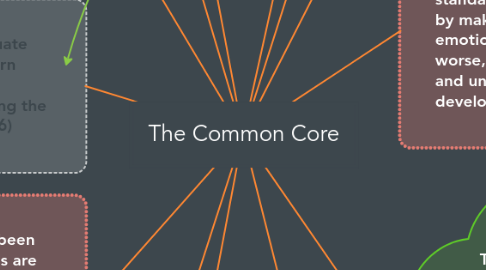The Common Core
by Heather Boyd

1. No Child Left Behind allowed goals set by the state, leaving some states having proficient levels and others unable to achieve the marks (Cody, A. 2014. p.31).
2. NCLB has a steady focus on math and reading when defining school accountability. The problem has lead to a focus almost exclusively on these subjects where history, art, and science are suffering.
3. Testing: A picture is painted of how great the "smart" technology is, that will allow tracking of student progress, with a hope of "equality for all". We have programs that will adjust to student levels. However, the bar has been set too low for students in poverty and are further hindering their progress (p. 32).
4. Cody (2014) argues that "what is good for assembly lines is not necessarily good for growing children" (p. 33) Although we are promised that standards only offer a framework, we are often externalizing assessments, and in return have lost our expertise as educators by "packaged curricula" (p.34).
5. Students are being forced into "college readiness" in Kindergarten. The assessments are often overly challenging and parents are, even with children at such a young age, told testing is for college readiness tracking (p. 35).
6. The Common Core is set to increase college graduates for "prowess in our country" (p.36)
7. The urgency for college graduate jobs may actually cause concern because there will be a large database of applicants reducing the level of pay and security (p. 36)
8. Playtime is being limited due to an increase need for covering standards. This hinders children by making them less socially and emotionally adjusted, but even worse, they are losing creativity and unwanted behavior has developed (p.37).
9. A promise for failure has been established- public schools are now further blamed for problems associated with standards and tests. Public schools that score low are seen as flawed and needing updating or a fix (p 38).
10. Technocracy provides a backwards approach with a data driven system. Teachers are no longer offering much creativity when lessons are developed for anticipated student responses. Teachers are also losing their interactive approach with students and teaching content that no longer engages them (p. 38).
11. Educators are no longer in charge of their success: "government should be there to assist and support but they should respect the jurisdiction of local school districts and the autonomy of teachers and students" (p. 39). This will allow teachers freedom within the classroom.
12. Bottom Line: Schools are labeled as failures for unwarranted reasoning. Pushing standards will not increase outcomes. Curricular guidelines are appropriate but elevated testing should not be the ultimate goal for schools. It is necessary to remember the community, parents, and students involved (p. 39)
13. Resources Cody, A. (2014). Common Core: Engine of inequity. In Gorski & Kirstein (Eds.) The big lies of school reform: Finding better solutions for the future of public education. New York: Taylor & Francis. 31-41


